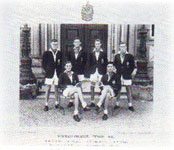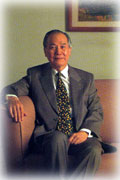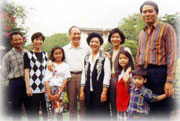| Anand Panyarachun
was born on 9 August 1932 in Bangkok, the youngest of twelve children of the family
of Maha Ammat Tri Phya Prichanusat (Sern Panyarachun)
and Khunying Prichanusat (Pruek Chotikasathien).
Phya Prichanusat received his early education in
Thailand and won a King's scholarship after completion of his secondary school
education. He was sent to Shrewsbury School in Shropshire, England, after which
he entered Manchester University. Phya Prichanusat
started his career in Thailand's Ministry of Education, where he assumed various
teaching roles. He became Headmaster of Vajiravudh College, a school which was
modelled after the English public school system. In the course of his career,
Phya Prichanusat was apppointed to the highest civil service post, namely Permanent
Secretary of the Ministry of Education. Soon
after Thailand was transformed into a constitutional monarchy in 1932, Phya Prichanusat
left the civil service to set up a publishing business with a group of colleagues.
The company he founded, namely the Siam Commercial Company Limited, published
newspapers in Thai, Chinese and English. Phya Prichanusat served as the Editor
of The Siam Chronicle, which today, under a new ownership, is known as
The Bangkok Post. His career in publishing was further distinguished by
his becoming the founder and first President of the Press Association of Thailand. Apart
from his journalistic accomplishments, Phya Prichanusat also was the first non-Christian
President of the Young Men's Christian Association (YMCA), and was instrumental
in founding the first school for the blind in Thailand.  As
the youngest son of Phya Prichanusat, Anand Panyarachun's early education was
at Surasak School, after which he proceeded to Amnuaysilp School and Bangkok Christian
College for his secondary school education. In 1948, Anand was sent to Dulwich
College in London at the age of 16 years. While at Dulwich, he became both a House
Prefect and a School Prefect. He was a member of the School Choir, the Squash
Team, and served as Captain of the School Tennis Team, which had an unbeaten record
in 1951. As
the youngest son of Phya Prichanusat, Anand Panyarachun's early education was
at Surasak School, after which he proceeded to Amnuaysilp School and Bangkok Christian
College for his secondary school education. In 1948, Anand was sent to Dulwich
College in London at the age of 16 years. While at Dulwich, he became both a House
Prefect and a School Prefect. He was a member of the School Choir, the Squash
Team, and served as Captain of the School Tennis Team, which had an unbeaten record
in 1951. After leaving Dulwich in 1952, Anand
entered Trinity College, University of Cambridge, where he read Economics and
Law. He graduated in 1955 with honours. At Cambridge University, he also was a
member of the squash and tennis teams for Trinity College. After
completing his education in 1955, Anand joined Thailand's Ministry of Foreign
Affairs. In 1958, he was appointed as Secretary to the Foreign Minister (H.E.
Dr. Thanat Khoman). He was subsequently assigned to the Permanent Mission of Thailand
to the United Nations in 1964 and was promoted to an Ambassadorial ranking in
1967 as Acting Permanent Representative of Thailand to the United Nations and
concurrently as Ambassador of Thailand to Canada. In 1972, he was reassigned as
Thailand's Ambassador to the United States and, concurrently, as Thailand's Permanent
Representative to the United Nations. His tenure with the United Nations was for
a continuous period of 12 years from 1964 to 1976. In
January 1976, Anand was promoted to the highest civil service ranking as Permanent
Secretary of the Ministry of Foreign Affairs of Thailand. In that position, he
was instrumental in the implementation of the Thai Government's foreign policy
of adjustment to the new geopolitical landscape. Anand assumed a leadership role
in negotiations with the U.S. Government on the eventual withdrawal of U.S. troops
from Thailand. He also was catalytic in leading efforts for the resumption in
1976 of diplomatic relations with three socialist countries, namely China, Laos
and Vietnam.  After
the tumultous events of 6 October 1976, Thailand experienced a military backlash
and the return of a military-led authoritarian rightist government. As a result,
Anand became the victim of a rightist conspiracy. He was wrongly accused of being
a communist, which was considered at that time to be a criminal charge, and was
suspended from his position as Permanent Secretary on those bogus allegations.
A civil service panel was set up to investigate the allegations. On the basis
of the evidence presented and testimonies given by witnesses, the panel found
the charges to be totally unsubstantiated and absolved Anand of any wrongdoing. After
the tumultous events of 6 October 1976, Thailand experienced a military backlash
and the return of a military-led authoritarian rightist government. As a result,
Anand became the victim of a rightist conspiracy. He was wrongly accused of being
a communist, which was considered at that time to be a criminal charge, and was
suspended from his position as Permanent Secretary on those bogus allegations.
A civil service panel was set up to investigate the allegations. On the basis
of the evidence presented and testimonies given by witnesses, the panel found
the charges to be totally unsubstantiated and absolved Anand of any wrongdoing.
Anand was thus reinstated into the Ministry of Foreign
Affairs, and was assigned to Bonn as Thailand's Ambassador to the Federal Republic
of Germany. After serving for one year, he decided to retire in 1979 from the
Ministry of Foreign Affairs, thus ending an illustrious career
of twenty-three years in the Thai foreign service. Anand
started his second profession in 1979 in
the private sector with the Saha-Union Group, where he assumed the position
of Vice-Chairman and Director of several of its subsidiary companies. In 1991,
Anand was elected Chairman of the Board of Directors of the Saha-Union Group. During
his business career, Anand was actively involved in the work of the ASEAN Chambers
of Commerce and Industry. He headed an ASEAN Task Force during 1982-1983, which
charted the course of ASEAN economic cooperation. Anand
was also elected Chairman of the Federation of Thai Industries in 1990 after serving
as Vice-Chairman from 1988 to 1990. In addition, he served as a Director of Sime
Darby Berhad from 1982 to 1998, and a Director of the Siam Commercial Bank from
1984 to present day. Following the military
take-over in February 1991, Anand was invited to serve
as Prime Minister of Thailand in March 1991. While reluctant to assume that
political position in the aftermath of the extra-constitutional process, Anand
was convinced that by assuming the position, he could help lead Thailand back
to the path of democracy. Anand wanted to
minimize the damage inflicted on Thailand's democratic process, and reverse the
practice of militarization of politics in the country. He further believed he
could successfully establish a civilian-dominated government, which could ensure
a smooth and peaceful transition to an open society, institute much needed economic
and social reforms, and promote a more transparent and accountable system of governance
in Thailand. He succeeded in most of what
he aspired to do. His Government initiated reforms in several key sectors of the
Thai economy, including tax and trade regimes, industrial restructuring, environmental
management, educational and health services. For the latter, Anand was the first
Asian leader to recognize HIV/AIDS as a major development challenge and to mount
a nation-wide program in 1991 to combat the epidemic in Thailand. As a result,
Thailand was able to significantly reduce the number of HIV infections due to
the effective HIV prevention program instituted by the Anand Government. Anand's
earlier work at the ASEAN Chambers of Commerce and Industry to promote regional
economic cooperation provided a basis for the blueprint of the ASEAN Free Trade
Area (AFTA), which Anand proposed during his tenure as Prime Minister of Thailand.
AFTA, proposed by Thailand, was subsequently endorsed at the 1991 ASEAN Summit,
held in Singapore, which Anand attended as Head of Government. Anand's
Government organized free and fair general elections in May 1992 to return democratic
rule to the Thai people. After those elections, problems arose in the Parliamentary
selection of the Prime Minister, who was generally perceived by the public as
being a legacy of the discredited military clique. Trouble
spilled into the streets; protests and public demonstrations ensued. There was
an attempted military suppression resulting in violence and loss of life. Chaos
reigned and anarchy threatened to break out. His Majesty the King made a timely
intervention and judiciously restored peace and harmony. Anand
was nominated by the President of the Parliament to again assume the Prime
Ministership for the second time. His nomination, was widely welcomed by the
public, and was endorsed by Royal Proclamation on 10 June 1992. Anand's
mandate was to ensure the continuation of peace and order, and to hold new general
elections in the near future. His second tenure lasted four months during which
he facilitated a nation-wide healing process. Anand helped to ensure that justice
was served by holding a number of generals accountable for the May 1991 suppression
through removing them from their command positions. After the general elections
in September of that year, Anand retired from politics in October and rejoined
the Saha-Union Group as Chairman. In
October 1992, Anand resumed his business career but continued his public service
work in a personal capacity. He has been called upon to assist successive
civilian governments in the areas of economic and social policies, human rights
and governance. In 1997, Anand was elected
as a member of the Constitution Drafting Assembly and was appointed Chairman of
the Drafting Committee. He oversaw the drafting of the Constitution, which was
completed within the prescribed time of 240 days, and approved after intensive
debate by the National Assembly. The approved text of the Constitution was then
submitted to His Majesty the King for His Royal assent and promulgated as the
new Constitution of the Kingdom of Thailand on 11 October 1997. In
August 1997, Anand received another distinction by being conferred the 1997 Ramon
Magsaysay Award for Government Service. His interest and activities in the
fields of education and the environment include Chairmanship of the
Cambridge Thai Foundation, Thailand Development Research Institute
(TDRI), the Council of Trustees of Thailand Environment Institute
(TEI), the Council of Asian University of Science and Technology
(AUST), the Board of Trustees of the Asian Institute of Technology
(AIT), Kenan Institute Asia and Honorary International Advisor to
the Governors of Dulwich College, London.
He is currently a member of the International Advisory Board of
American
International Group (AIG), Unocal Asia Pacific Ventures, the Carlyle
Group
and Toyota Motor Corporation. He is also Regional Advisor of General
Electric
(GE).
Anand was in 2001 elected Chairman of the National Economic and Social
Advisory Council for a term of 3 years.
In the international arena, Anand is a trustee of U Thant Institute,
the
chairman of the Steering Committee of Asia Pacific Leadership Forum on
HIV/AIDS and Development (APLF), a member of the Advisory Group of
Anti-Corruption Issues for the East Asia and Pacific Region - World Bank
and the
Advisory Council of Transparency International (TI). He has also
served as
UNICEF Ambassador for Thailand since 1996.
In November 2003, UN Secretary–General Kofi Annan appointed Anand
Chairman of a group of eminent persons to serve on his High-Level
Panel on
Threats, Challenges and Change which is to examine the major threats
and
challenges the world faces in peace and security and make
recommendations
for the elements of a collective response. The Panel is expected to
submit its report to the Secretary–General on December 1, 2004.
During
the course of five decades of his working life, Anand has been recognized both
internationally and nationally for his dedication and work for the advancement
of Thai society. He is the recipient of twenty
honorary degrees from universities in Thailand, Canada, Hong Kong and Japan. Anand
has also been awarded a number of decorations,
both Thai and foreign, including The Royal Cypher Medal (Third Class) ; Knight
Grand Cordon (Special Class) of the Most Noble Order of the Crown of Thailand
; Knight Grand Cordon (Special Class) of the Most Exalted Order of the White Elephant;
Knight Grand Commander (Second Class, higher grade) of the Most Illustrious Order
of Chula Chom Klao; Order of Diplomatic Service Merit (First Class), Republic
of Korea; Ringtang Jasa (First Class), Indonesia; Grand Officier de L'order de
la Couronne (Second Class), Belgium; Grand Cordon of the Order of the Rising Sun,
Japan; Honorary Knight Commander of the Civil Division of the Most Excellent Order
of the British Empire (KBE), United Kingdom.  Anand
is married to M.R. Sodsee Chakrabandh. They have two daughters - Nanda and Daranee,
and three grandchildren - Tippanan, daughter of Nanda and Kraithip Krairiksh,
and Sirinda and Tanawin, daughter and son respectively of Daranee and Chatchawin
Charoen-Rajapark. Anand
is married to M.R. Sodsee Chakrabandh. They have two daughters - Nanda and Daranee,
and three grandchildren - Tippanan, daughter of Nanda and Kraithip Krairiksh,
and Sirinda and Tanawin, daughter and son respectively of Daranee and Chatchawin
Charoen-Rajapark. A Thai-language account
of Anand Panyarachun's life and career can be found in the biography Anand
Panyarachun: Chiwit khwamkhit lae kan-ngan khong adit nayokratthamontri song samai,
authored by Prasarn Maruekpitak and colleagues and published by Amarin Printing
and Publishing Public Company Limited. For
full biographical data, please press here. |